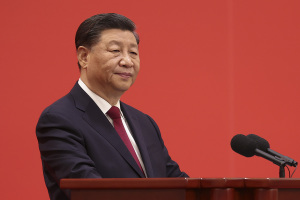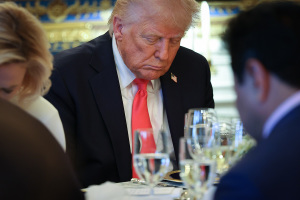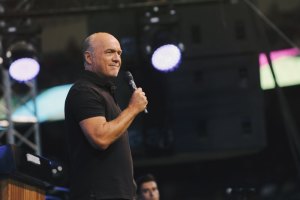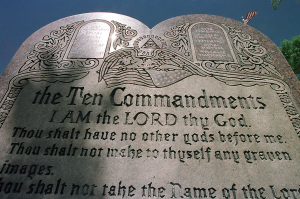Interview: Samuel Rodriguez on Reconciling Billy Graham and Martin Luther King, Jr.
A new social movement is needed in the Church in America that reconciles Billy Graham's message with Dr. Martin Luther King, Jr.'s march, the Rev. Samuel Rodriguez argues in his new book, The Lamb's Agenda: Why Jesus is Calling You to a Life of Righteousness and Justice.
Rodriguez, president of the National Hispanic Leadership Conference and a senior editorial advisor for The Christian Post, uses Graham and King to symbolize two dimensions of the Christian mission. Like the cross, there is the vertical dimension that looks to God and is concerned with personal righteousness and the horizontal dimension that looks to others and is concerned with justice.
In an interview with The Christian Post, Rodriguez talked about how this movement became his life's mission and the proper role of Christians in the political sphere.
The following is an edited transcript of that interview.
CP: Billy Graham and Martin Luther King, Jr. are featured prominently in the book to symbolize what you call the vertical and horizontal aspects of the cross, the search for both personal rightousness, symbolized by Graham, and the search for societal justice, symbolized by King. Why do you like to use these two figures to symbolize those dual aspects of the Christian mission?
Rodriguez: These two figures are both iconic and transformative, catalytic in a sense. They, in my opinion, serve as the quintessential examples of their corresponding representative points.
Billy Graham. No other individual is responsible for exemplifying the evangelical message, the message of salvation through Christ alone as the way more than Billy Graham. His integrity, his character, his presentation, it's now the model to emulate.
And Dr. King, likewise, the engagement of biblical allegories, metaphors, scripture, his prophetic presences and activism. Martin Luther King, Jr., basically contexualized the American narrative, the idea that if you ever want to see a civil rights movement in America, it has to have a faith-filled moral imperative or you will never succeed.
In evangelicalism, those are the quintessential examples, and because of that, that's my life mission, to reconcile Billy Graham's message with Dr. King's march. Because, in the 20th century, the Bible-believing Church in America picked sides in a de-facto manner. White evangelicals stood on the sidelines as Dr. King marched, and prominent white evangelicals leaders would make statements from their pulpit about how marching and political engagement runs counter to scripture.
To great degree, they stood in opposition to what was taking place in the Civil Rights Movement in the 1950's and 60's ending segregation. For the African-American community, that is commited to biblical orthodoxy, that, basically, knows the Word more than any other community in America, to this day, African-Americans have a problem being labled evangelicals. If you were to go through the criteria of what identifies you as an evangelical, the African-Americans would nod their heads and say, "yeah, that's me." Then you ask, "are you evangelical?" and they respond, "absolutely not," because they've seen evangelicalism tarnished by the label of one ideology, or suffering cultural and spiritual myopia. So, the Bible-believing Church in America stood divided between the followers of Billy Graham and the followers of Dr. King.
In the 21st century, in order for us to build a firewall of righteousness and justice, to preserve Bible-believing Christianity in the 21st century, we don't have a choice, we must reconcile Billy Graham's message with Dr. King's march.
CP: How did that become your life's mission? Was it a slow process or was there a transformative experience?
Rodriguez: There was a transformative experience at the age of 14. I watched a television special on Billy Graham, one of his crusades, and an hour later, at 11 p.m. on PBS, there was special on Dr. King's March on Washington.
My mom is not a preacher, my dad is not a preacher. I was basically a book nerd committed to mathematics. I had one goal in life. I wanted to be an computer engineer for IBM.
At that very precise moment I had my "road to Damascus" experience. I had my epiphany, what Jon Stewart would call his "moment of zen." I really, really sensed a tugging at my heart. I wrote it down at the age of 14. I wrote it on the inside cover of my Bible.
From there it has been a journey. The good Lord, through divine providence has provided the resources, the relationships. He has provided everything that I need and He has opened up doors that no man has been able to shut, facilitating an avenue and a platform by which I can disseminate this message of reconciliation between Billy Graham's message and Dr. King's march.
This is a manifesto and a clarion call. The Lamb's agenda is a call for a movement. I want the next great movement in America not to be a Tea Party or Occupy Wall Street, but a Christ-centered, Bible-based, righteousness and justice movement in the name of Jesus.
CP: You argue that it is a mistake for the Church to be identified with a political party.
Rodriguez: Yes.
CP: You are also arguing for a new social movement, a new civil rights movement, that combines the vertical and horizontal.
Rodriguez: Yes.
CP: So, why is political activism through a social movement OK, but political activism through a political party not OK?
Rodriguez: I'm not saying political movements through a political party is not OK, I'm saying the Church of Jesus Christ should never be married exclusively to one political ideology. We need to be prophetically independent.
If we are to be the Daniel's of the Old Testament, the Joseph's, the Esther's, the Jeremiah's, the Isaiah's, if we are to be the prophetic voice, the moral conscience, as Dr. King would allude to, of the nation, if we are to speak prophetically to the corridors of power, we need to be independent. And by independent I mean we need to rise above the political fray. We can't be married to the donkey or to the elephant.
My concern is this, it is this idea of going to the voting booth and voting because I am a Republican, voting because I am a Democrat, voting because I am a Libertarian, when these ideas run counter to scripture. When we go into the voting booth, we must vote first and foremost our Christian identity, our Christian view.
What is the number one moniker that guides us, the number one optic that guides us? Is it my ethnicity? Do I go in to the voting booth because I am Hispanic-American? Because I am black? Because I am white? What drives me to pull that lever? It needs to be my Christian worldview.
The number one identifying descriptor in my life is not that I'm black, white, yellow, brown, Hispanic, charismatic or automatic, it is that I am a born-again child of God. That descriptor should guide me.
When we are tied in to one political ideology, we can't deny the fact that after 1979 we saw the evangelical Church in America, in essence, marry the Republican Party. I can't deny the fact that the Republican Party has a number of very powerful, compelling, affirming threads to the Judeo-Christian value system imbedded in their charter currently (that can always change every four years). So, there's a practical component. Nevertheless, that marriage has led to alienating a significant portion of the Bible-believing community in America, which would be African-Americans and, now, 50 percent of Latinos.
Also, when the Republican Party did sway away, when the Republican Party does affirm values that run counter to our Judeo-Christian value system, there seems to be a bit of angst on behalf of white evangelical conservatives to speak on these issues. That's why, when we are above the fray, when we are independent, we can speak to both parties.
We can look at the donkey and say, your anti-life platform is morally reprehensible. We believe that John F. Kennedy would be turning in his grave with what you do as it pertains to abortion. It's unacceptable. So we speak truth to the Demoratic Party and say, you attempt to do justice but you're doing it through uber government entitlement. You want to replace the Lord with Uncle Sam as our shepard and we shall not want. And you're going beyond creating a safety net.
To the Republican Party, we can say, you are not the party of Abraham Lincoln. You have totally denied and negated the justice component. This Party was founded on an incredible moral imperitive of doing justice, of ending slavery. You don't even mention justice. When do Republicans discuss justice? They acquiesce. They surrender the idea of justice to the extreme other side.
So, we look at the Republican Party and say, what are your ideas about the poor, ending poverty, what about sex trafficking, what about abortion. You talk about being the party of life, but what does that mean from a concrete basis?
OK, so you oppose Obamacare. Fine. We understand what it means for religious liberty. What's the alternative, though? The Republicans need to learn how to have what I call a replacement theology. They are always countering – oppose, oppose, oppose – but they need to be able to offer a viable alternative that has social, cultural components, that do justice, that do good, that do work for the common good.
So, the Lamb's agenda says, as a Christian, we are the most influential constituency in America because we have this optical morality, we have this righteousness, we know that there are absolutes, that there is right and wrong. We are guided by the way, the truth and the life. But we are also guided by justice. So, we are the most influential catalytic community in the United States of America, and we should be. Not for the sake of gaining political power. It's not about politics, it's about changing the world for good. It's about doing good in America. It's about helping our fellow man and lifting those up that are on the margins. That's Christianity. It's John 3:16 and Matthew 25.
CP: If three out of four evangelical voters feel more comfortable identifying with the Republican Party, how do evangelicals avoid the impression that their religion is partisan?
Rodruiguez: The fact of the matter is, yes, 75 percent of evangelicals vote Republican. And, by the way, again, if we were to look at both charters, the Republican and the Democratic charter, I can't deny the fact, the Republican charter resonates more on the vertical values with our Christian worldview than the Democratic Party.
The problem is the horizontal where the Republican Party is weak. The Democrats try to get the horizontal, and even at that they fall short, but they do a better job on the horizontal and a terrible job on the vertical.
Here's the problem though, will that continue? With the growth of the Latino community in America, the next generation of white evangelicals voting less and less Republican, my projection and my prediction is that, inevitably, in the next 20 years, born-again followers of Jesus Christ in America will serve as the majority membership of independent voters in America. In essence, we, as Christians, will become the new independent movement.
My 22-year-old daughter does not want to register Republican or Democrat. She's beyond partisan politics. But, she's committed to God, she's committed to Christ. She's committed to life, she's commmitted to doing justice. So, she's committed to the values of biblical orthodoxy. She's tired of political partisanship. She doesn't see either party committed to changing the nation for good.
I believe the Christian Church is going to emerge as the independent bloc. So, it's no longer about the Democratic Party or the Republican Party, they're going to have to come to us. We're not going to endorse them. They're going to have to come to us and endorse our agenda.
CP: In the Summer of 1964, Lyndon Johnson signed the Civil Rights Act. Later that year, in November, there was a presidential election in which Johnson ran against Senator Barry Goldwater, who voted against the Civil Rights Act. You have said you don't endorse candidates, but Martin Luther King, Jr. endorsed LBJ that year. Was he wrong to do so, or was that a special circumstance?
Rodriguez: Great question. My preferable choice would have been for Dr. King not to have endorsed LBJ.
Dr. King was registered Republican prior, likewise Jackie Robinson and others. I understand this historic, for evermore life changing decision, this support by LBJ of the Civil Rights Act. Dr. King wanted to affirm and validate the action taken by LBJ.
We know that four years prior, already, the African-American community started to sway towards the Democratic Party in a significant manner. A community that, those that were allowed to vote, voted more Republican than they did Democrat since it was the Republican Party that ended slavery. The loyalty shifted that decade. Dr. King solidified the loyalty shift with that endorsement. The iconic figure of the community endorses LBJ.
We want to get to a point where our voices are not necessarily in the business of endorsing political candidates. It's about the political platforms endorsing our values, embracing our values. That's what I see being the agenda.
But, by the way, I want to be clear, I'm not talking about surrendering politics. Quite the opposite. I want to see a generation engaged politically like never before. I want to see more Christ-following individuals involved in the political sphere. Christ-followers that are full of integrity, that are committed to living it, not just preaching it, that are transparent and authentic.
I want to see Christ-followers committed to biblical truth as mayors, council people, governors, state representatives and national representatives in the House, Senate and White House. But I want to see that emerge free from political manipulation. I am a Christian first and foremost.
CP: A recent Pew Research survey showed 55 percent of white evangelicals believe that immigrants today are a burden and 58 percent of white evangelicals believe that the growing number of newcombers threaten our values rather than strengthens society. How important is it for evangelicals to address the anti-immigrant sentiments in their own pews?
Rodriguez: Oh, uberly important. We began this journey back in 2006 of educating our white evangelical brothers and sisters, and that educational process is an ongoing process.
Why do we have to educate my wonderful brothers and sisters in Christ? Because many of them suffer from cultural myopia. Many of them view what takes place in America exclusively through the optics of a political ideology, and that's wrong.
If they viewed the immigrant through the lens of Christianity, they would have no other choice but to reconcile Matthew 25 with Romans 13. They would have no other choice but to read scripture and say, how am I going to measure whether or not you're a sheep or a goat. It's how you treat the alien, the stranger, the immigrants among you. Whether you quench the thirsty and feed the hungry. So, if they would read Matthew 25 they would have this great moment, eyes opening up, saying, yes, we must demonstrate biblical compassion.
Though we know the fact that people came here illegally, they could say, we love immigrants, they are children of God, the imago Dei, the image of God, we want them to come here legally. I would have no problem if they said that. Matter of fact, I would say that, how about that.
I have a problem when they talk about this group is threatening our values. That is scary. And, that is troublesome, because, let me tell you what values we have as immigrants. We love God, we love family, and we love hard work. That's it. I just listed our key values. So, if God-fearing, family-loving, hard-working values are a threat to the American value system today, then we do have a problem. That means they would have a problem with the Protestant work ethic. They would have a problem with Plymouth Rock and Jamestown. If you have a problem with immigrants today and the values that we hold dear, we espouse, then you have a problem with Plymouth Rock and Jamestown.




























